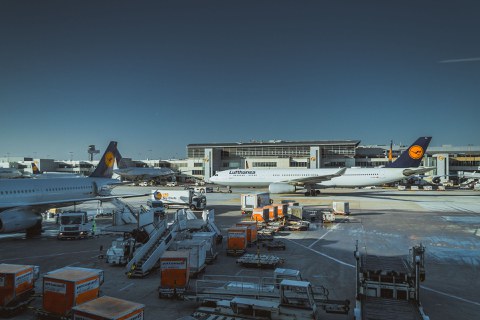Aug 11, 2021
DFG funds research project in traffic sciences at TU Dresden
Integration of security indicators in the approach management of major airports increases airspace and runway capacities
Success for Prof. Hartmut Fricke and his team from the Chair of Air Transport Technology and Logistics at the Faculty of Transport Science "Friedrich List" of the TU Dresden: The German Research Foundation (DFG) has approved the funding application for the topic "Safety-optimized approach control at large airports".
The 3-year project is about measuring security and integrating it as key figures into the approach management of major airports. "This is intended to achieve further increases in the utilization of existing infrastructure capacities (e.g. airspace and runway capacities) - while still observing and complying with applicable international security guidelines and standards," explains Prof. Hartmut Fricke.
The starting point for the project is today's capacity-critical approach control at (large) airports. It is subject to constant fluctuations in operational operation, due to the weather and traffic composition. At the moment, only operational performance indicators are recorded and security is put “in front of the brackets” by means of always conservative application of rules: the system has thus been secured by conservative - and thus capacity-restrictive - rules on separation values between the aircraft. As a result, the system always works in a safe, but not overall optimal operating state.
Increase in the degree of automation in air traffic control
This is where the TUD project comes in: The current capacity-critical approach control is integrated into an overall optimization process with a special focus on air traffic safety using safety analysis procedures developed at the professorship. By integrating the safety assessment as an online process, a tactical level is to be achieved on which safety analyzes are constantly incorporated into the performance assessment - and thus additional airspace and runway capacities can be used during operation. In terms of methodology, multi-objective optimization procedures are applied to an agent-based high-speed simulation available at the professorship. In addition, research should also be carried out into how the degree of automation in air traffic control can be increased by using such a method and how this increasing automation affects traffic safety.
The designed safety/performance analysis model should finally be made predictive with the help of machine learning methods and system modeling methods in order to enable the necessary foresight on the coming traffic situation. "We want to validate the system as an example for a German airport," says Hartmut Fricke. The professorship cooperates with DFS - Deutsche Flugsicherung GmbH as well as Munich and Frankfurt airports.
Background: Air traffic has increased enormously in the past 75 years and currently commutes around 3 million controlled flights per year over Germany alone and more than 10 million flights over Europe (sources: Deutsche Flugsicherung, “Mobility Report” 2018; Eurocontrol, “Performance Review Report (PRR) "2018). Due to the constant consolidation of the airlines (a few large remaining), it is evident that traffic is concentrated even more on important connecting routes and thus control areas of air traffic control and finally hub airports, with Germany, in particular, being particularly burdened due to its central geographical location. The inhomogeneity of the traffic density increases and with it the complexity of the traffic. New methods and models are required in order to reconcile optimal control and utilization with the primary goal of civil aviation, safety.
Contact:
Prof. Hartmut Fricke
Chair of Air Transport Technology and Logistics
About the Faculty of Transport and Traffic Science "Friedrich List" at the TU Dresden:
The faculty is the only faculty in Germany dedicated to traffic sciences and an internationally recognized competence for sustainable mobility. The interdisciplinary research covers the entire breadth of transport on land and in the air. The faculty is a pioneer in the development of systemic solutions for the design of safe, efficient and sustainable transport systems according to technical, economic, ecological and social criteria. Research and teaching are interdisciplinarily networked within the TU Dresden and the DRESDEN-concept network as well as together with national and international partners from science and practice. More than 200 scientists research and teach at seven institutes and 20 professorships. The faculty offers 6 courses of its own, including the diploma course in traffic engineering, the bachelor course in traffic economics and 4 master courses. For practical applications in research and teaching, the researchers and 1,100 students have around 30 laboratories or experimental and test facilities at their disposal. https://tu-dresden.de/bu/verkehr
Informationen for journalists:
Anke Richter-Baxendale, Öffentlichkeitsarbeit
Faculty of Transport and Traffic Sciences "Friedrich List"
Tel.: +49 351 463-34908

